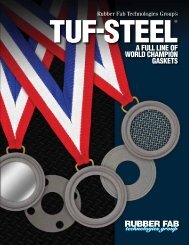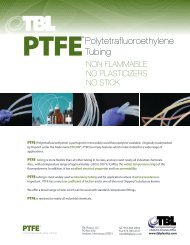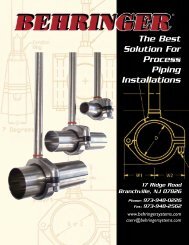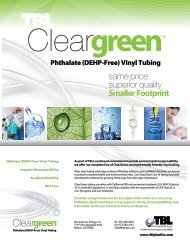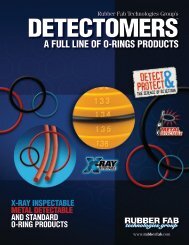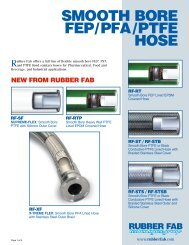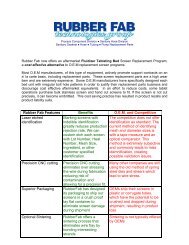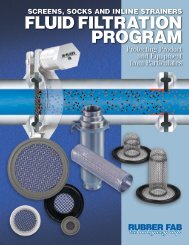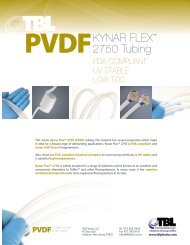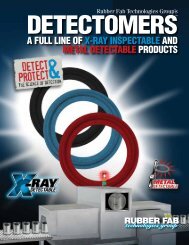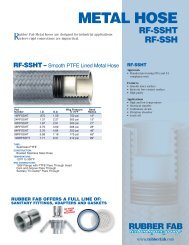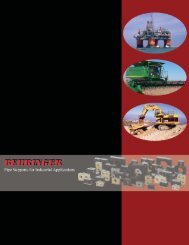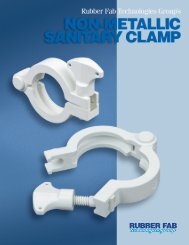HYGIENIC SEAL MATERIAL GUIDELINES
HYGIENIC SEAL MATERIAL GUIDELINES
HYGIENIC SEAL MATERIAL GUIDELINES
Create successful ePaper yourself
Turn your PDF publications into a flip-book with our unique Google optimized e-Paper software.
<strong>HYGIENIC</strong> <strong>SEAL</strong> <strong>MATERIAL</strong> <strong>GUIDELINES</strong><br />
1 = Excellent 2 = Good 3 = Acceptable 4 = Marginal 5 = Poor X = Do Not Use<br />
Gasket Continuous Intermittent Pure Pure Process Process Process Temp.<br />
Stream Steam Water Water Fluids Fluids Fluids Variable Range<br />
Comments Ambient Hot Ambient Hot (100’C)<br />
Tuf-Steel ® 1 1 1 1 1 1 1 -100°F to<br />
Maintains seal with wide temperature variations. Has extended service life.* 500°F<br />
Tuf-Flex ® 1 1 1 1 1 1 1 -100°F to<br />
Maintains seal with wide temperature variations. Has extended service life.* 350°F<br />
PTFE 1 1 1 1 1 1 3 -100°F to<br />
Wide temperature variations and may cause leakage at ∆T. 500°F<br />
Silicone (platinum) 2 2 2 2 2 2 1 -40°F to<br />
Very flexible low temperature. 450°F<br />
FKM Fluoroelastomer 3 2 2 2 2 2 2 -30°F to<br />
Acceptable for steam applications. 400°F<br />
EPDM (peroxide cured) 3 3 3 3 3 3 3 -30°F to<br />
Low pressure steam only. 300 °F<br />
Buna 0 0 5 5 5 5 5 -30°F to<br />
Not recommended for strong acids and ozone. 200°F<br />
* Application dependent.<br />
• Tuf-Flex ® : Tuf-Flex is the world’s only<br />
unitized gasket, setting new standards<br />
for purity, performance and flexibility.<br />
A Tuf-Flex Gasket’s contact surface is<br />
a layer of PTFE unitized to an EPDM<br />
rubber inner core. This totally bonded<br />
construction provides a PTFE gasket with<br />
the mechanical characteristics, including<br />
memory, of an elastomer gasket. Designed<br />
to meet critical requirements in biopharmaceutical,<br />
ultra-pure water, WFI<br />
(water for injection) and difficult food<br />
and beverage processing, Tuf-Flex<br />
out performs other gaskets while<br />
eliminating costly process interruptions.<br />
Achieve higher performance under<br />
SIP/CIP conditions.<br />
• Tuf-Steel ® : A unique 50/50 blend of nonpigmented<br />
PTFE and 316L, water atomized<br />
and passivated, delivers leak-proof<br />
performance. Tuf-Steel is the choice for<br />
leak-proof, perfect surface performance<br />
and outstanding durability in SIP<br />
(steam in place) and WFI (water for<br />
injection) applications. Tuf-Steel is ideal<br />
for sanitary steam pipe connections<br />
in extreme temperatures ranging from<br />
-20°F to 500°F. The superior strength<br />
of Tuf-Steel eliminates cold flow and<br />
creep to prevent maintenance problems<br />
and system downtime.<br />
• PTFE is the material of choice whenever<br />
low temperature flexibility or gasket<br />
memory is not required (not recommended<br />
where large temperature variations occur<br />
frequently, leakage can occur). PTFE<br />
has almost no extractables, has a low<br />
absorption rate and excellent resistance<br />
to process fluids. It can remain in service<br />
for longer periods of time in both water<br />
and steam for continuous use, high pressure<br />
clamps are recommended to prevent<br />
leakage resulting from temperature variations.<br />
PTFE envelope gaskets with a FKM<br />
Fluoroelastomer inner core should be<br />
used if slight misalignment is observed.<br />
• Platinum Cured Silicone is the material<br />
of choice in sanitary water systems when<br />
PTFE is not feasible due to severely<br />
misaligned fittings, or if the cost of high<br />
pressure clamps does not outweigh the<br />
benefits of PTFE (extended service life).<br />
• FKM Fluoroelastomer and EPDM compounds<br />
are specified by many of our<br />
process equipment manufacturers. They<br />
are generally suitable for these applications,<br />
however, service life must be considered<br />
and a preventative maintenance program<br />
be implemented to mitigate degradation.<br />
They are acceptable, but not recommended<br />
for continuous use in SIP procedures.<br />
• Buna is the last choice in most applications<br />
due to temperature limitations and<br />
does not pass U.S. Pharmacopeia<br />
Class VI Certification and Cytotoxicity.<br />
This sheet indicates general preferences.<br />
Unique applications may require further<br />
considerations and analysis. When selecting<br />
hygienic seal materials it is important<br />
to consider many factors: resistance to<br />
heat, resistance to SIP, resistance to chemicals<br />
like; hydrocarbons, ethanol, ketones,<br />
etc, tear strength, and flexibility. The<br />
service life of a material depends on<br />
the application. Many of the materials are<br />
acceptable if the expected service life is<br />
very short in duration, however, in extended<br />
exposure situations the material can<br />
degrade quickly rendering it ineffective or<br />
less desirable overall. This analysis was<br />
intended for hygienic seal applications<br />
specifically. Sanitary gasket applications<br />
are inherently static and can be dynamic.<br />
When different performance attributes are<br />
a consideration in dynamic applications,<br />
Tuf-Steel may be the material of choice.<br />
® Torque-Rite, Tuf-Flex, Tuf-Steel and ADI Free<br />
are registered trademarks of Rubber Fab<br />
Technologies Group.<br />
Torque-Rite: United States Patent Number 6,082,941.<br />
©2004 Rubber Fab Technologies Group – rev. 8/05 – #RF-140



